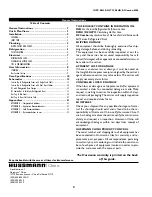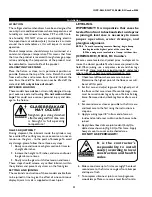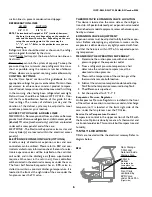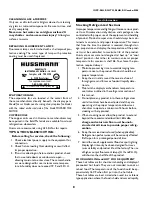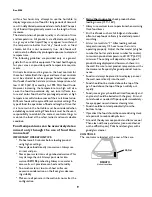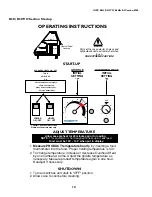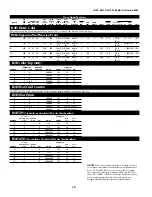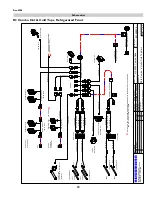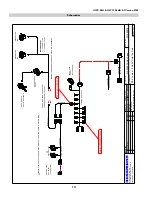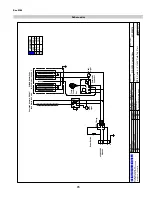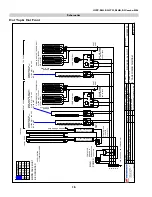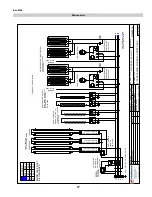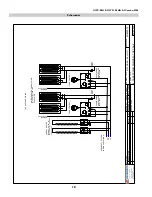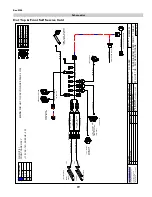
Rev.0208
5
back and side to side on inside bulkheads at joint.
8. Attach sections together via a 2 bolts located in the
base of the case. Secure the overhead structure by
bolting the bracket, located inside behind lights.
9. Apply bead of silicone to top of bulkheads and slip
on stainless steel bulkhead cap. Also apply silicone
to seam between overhead light tubes.
10.Use finger to smooth silicone as thin as possible at
masking tape on inside and outside of rear mullion
(apply additional silicone if necessary). Remove tape
applied on line #3.
CORNER WEDGES
Corner wedges are attached via front and rear
camlocks. Use a 7mm allen wrench to turn the locks.
Do not overtighten! Join the top by using a joint
bracket (included in joint kit) with 3/8" bolts.
JOINT TRIM
After cases have been leveled and joined, and refrigera-
tion, electrical, and wasted piping work completed, install
the splashguards. Fasten along the top edge, or center, with
#10 X 3/8" sheet metal screws.
D
O
N
OT
S
EAL
J
OINT
T
RIM
T
O
F
LOOR
!
Installing R3HTO, R3HATO
All cases were tested at a level state before shipping. When
joining, use a carpenters level and shim enclosing or sup-
porting cabinet accordingly.
1. Make sure the cabinet you are installing the
R3HATO on is level.
2. Wire unit according to local codes.
Plumbing
WASTE OUTLET AND P-TRAP
The waste outlet is located off the center of the case on
one side allowing drip piping to be run lengthwise under
the fixture. There are 3 drains in each fixture that can be
easily located.
1-1/2",1", & 3/4" P-traps and threaded adapters are sup-
plied with each fixture. The 3 P-traps must be installed to
prevent air leakage and insect entrance into the fixture.
NOTE: PVC-DWV solvent cement is recommended.
Follow the manufacturer’s instructions.
INSTALLING CONDENSATE DRAIN
Poorly or improperly installed condensate drains can se-
riously interfere with the operation of this refrigerator,
and result in costly maintenance and product losses. Please
follow the recommendations listed below when installing
condensate drains to insure a proper installation:
1. Never use pipe for condensate drains smaller than
the nominal diameter of the pipe or P-trap supplied
with the case.
2. When connecting condensate drains, the P-trap
must be used as part of the condensate drain to
prevent air leakage or insect entrance. Store plumb-
ing system floor drains should be at least 14" off the
center of the case to allow use of the P-trap pipe
section. Never use two water seals in series in any
one line. Double P-traps in series will cause a lock
and prevent draining.
3. Always provide as much down hill slope (“fall”) as
possible; 1/8" per foot is the preferred minimum.
PVC pipe, when used, must be supported to main-
tain the 1/8" pitch and to prevent warping.
4. Avoid long runs of condensate drains. Long runs
make it impossible to provide the “fall” necessary for
good drainage.
5. Provide a suitable air break between the flood rim of
the floor drain and outlet of condensate drain. 1" is
ideal.
6. Prevent condensate drains from freezing:
a. Do not install condensate drains in contact with
non-insulated suction lines. Suction lines should be
insulated with a nonabsorbent insulation material
such as Armstrong’s Armaflex.
b. Where condensate drains are located in dead air
spaces (between refrigerators or between a
refrigerator and a wall), provide means to prevent
freezing. The water seal should be insulated to
prevent condensation.
WATER SUPPLY
Tap water contains more minerals and will contribute to
the mineral residue and buildup which may impair the case's
performance and create undesireable cleaning issues. It is
recommended that a 5 micro particle filter be used to
filter the incoming water supply. Be sure to flush the wa-
ter line before hooking it up to the filter to prevent block-
ing the filter.
Refrigeration -
R3H, R3HA with refrigerated front
REFRIGERANT TYPE
The standard refrigerant will be R-22 unless otherwise
specified on the customer order. Check the serial plate
on the case for information.
PIPING
The refrigerant line outlets are located under the case.
Locate first the electrical box, the outlets are then on the
same side of the case but at the opposite end. Insulate


